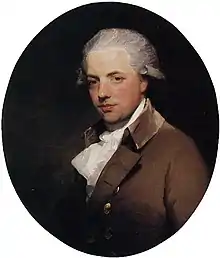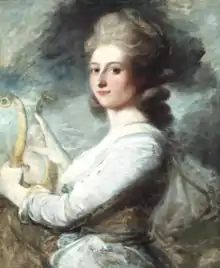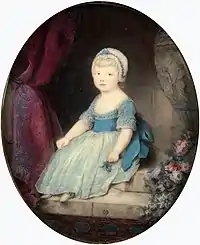Ozias Humphry
Ozias Humphry (or Humphrey) RA (8 September 1742 – 9 March 1810)[1] was a leading English painter of portrait miniatures, later oils and pastels, of the 18th century. He was elected to the Royal Academy in 1791, and in 1792 he was appointed Portrait Painter in Crayons to the King (i.e. pastels).
Ozias Humphry | |
|---|---|
 portrait by Gilbert Stuart | |
| Born | 8 September 1742 Honiton |
| Died | 9 March 1810 London |

%252C_Margravine_of_Anspach_by_Ozias_Humphry.jpg.webp)
Name
Humphry is the spelling Ozias himself used in his signature[2] on the backing card of his miniature of Charlotte, Princess Royal (1769; Windsor Castle). This is also the spelling given in the catalogues of the annual exhibitions of the Royal Academy from 1779 to 1795.[3] The different spelling in the far more common form of Humphrey may originally well be due to a mistake but was already in use during his own lifetime. It appears thus in the Royal Academy catalogues for the years 1796 and 1797[3] as well as in the writings of Horace Walpole and John Thomas Smith.[4] Humphry is the generally used spelling today.[5]

Education
Born and schooled in Honiton, Devon, Humphry was attracted by the gallery of casts opened by the Duke of Richmond and came to London to study art at Shipley's school. He also studied art in Bath (under Samuel Collins, taking over his practice in 1762); in Bath, he lodged with Thomas Linley. As a young artist, he found his talent encouraged by Thomas Gainsborough and Sir Joshua Reynolds, among others. His problems with his sight, which ultimately led to blindness, began in the early 1770s and forced him to paint larger works in oils and pastel.[6]

Italy
He traveled to Italy in 1773 with his great friend George Romney, stopping en route at Knole, near Sevenoaks in Kent, where the Duke of Dorset commissioned several works from him. His stay in Italy lasted until 1777.
On his return, his numerous subjects included George Stubbs (1777), fellow academician Dominic Serres, the chemist Joseph Priestley, and allegedly a portrait claimed to be of the teenage Jane Austen, from perhaps as early as 1790 (clothing styles suggest a later date), known as the "Rice" portrait after a later owner, though this has always been a controversial attribution of the sitter.[8] This failed to reach its minimum estimate in a Christie's auction in April 2007, and was withdrawn from sale.[9] His pupils included John Opie. He compiled a fifty-page manuscript A Memoir of George Stubbs, based on what Stubbs had related to him; it is the only contemporary biography. This was edited and privately published in the 1870s and republished in 2005.[10] He also knew William Blake and commissioned copies of some of his illustrated books. At least one of Blake's letters to him is a significant document for Blake's biographers.[11]
India

From 1785 to 1787, he travelled to India, producing many miniatures and sketches. He was elected a member of the Royal Academy in 1791. In 1792 he was appointed Portrait Painter in Crayons to the King. Most of his many portraits of the Royal Family are still in the Royal Collection.[13]
His sight finally failed in 1797, and he died in 1810 in Hampstead, north London.[14]
The bulk of his possessions came into the hands of his natural son, William Upcott, the book collector. From him the British Museum acquired a large number of papers relating to Humphry. He is alluded to in some lines by Hayley.[14]
References
- Remington, V. "Humphry, Ozias". Oxford Dictionary of National Biography (online ed.). Oxford University Press. doi:10.1093/ref:odnb/14165. (Subscription or UK public library membership required.)
- A photo of this signature is reproduced in: R. Walker, The Eighteenth and early Nineteenth Century Miniatures in the Collection of Her Majesty the Queen, Cambridge 1992.
- see Algernon Graves, The Royal Academy of Arts. A complete dictionary of contributors and their work from its foundation in 1769 to 1904, vol. IV, London 1906, s.v. Humphry, Ozias, R.A.
- John Thomas Smith, Nollekens and his Times, London 1828 ("Humprey"'s biography on pages 357 to 368). An example of this use is online in the "Blake" section, second edition 1829, volume 2 p. 489
- See for example V. Remington, Humphry, Ozias (1742–1810), Oxford Dictionary of National Biography, Oxford University Press, 2004 (online edn, Oct 2007), and the search result page of the National Art Library
- "Government Art Collection". Archived from the original on 3 August 2018. Retrieved 20 April 2007.
- "Portrait of Hyder Beg Khan". Paintings & Drawings. Victoria and Albert Museum. Archived from the original on 25 May 2011. Retrieved 17 October 2007.
- Reuters story, via Yahoo News
- Reuters story, and picture
- A Memoir of George Stubbs, Ozias Humphry (Author), Joseph Mayer (Editor), Anthony Mould (Introduction), Pallas Athene Arts; New Ed edition 2005, ISBN 1843680025, ISBN 978-1843680024. Long extracts were appended to the Tate Gallery's George Stubbs, Anatomist and Animal Painter Egerton, Judy; Taylor, Basil, 1976
- Letter to Humphry, in: John Thomas Smith, Nollekens and his Times, "Blake", second edition 1829, volume 2 p. 489
- Colonel Mordaunt's Cockfight, Johann Zoffany, Tate Gallery, accessed 18 April 2010
- 3 images online
- One or more of the preceding sentences incorporates text from a publication now in the public domain: Williamson, George Charles (1911). "Humphry, Ozias". In Chisholm, Hugh (ed.). Encyclopædia Britannica. Vol. 13 (11th ed.). Cambridge University Press. p. 892.
- "Collection of letters between Mary Nesbitt and Ozias Humphry". Royal Academy of Arts. Retrieved 6 April 2009.